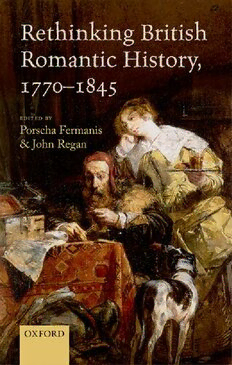
Rethinking British Romantic History, 1770 - 1845 PDF
Preview Rethinking British Romantic History, 1770 - 1845
RETHINKING BRITISH ROMANTIC HISTORY, 1770–1845 Rethinking British Romantic History, 1770–1845 Edited by PORSCHA FERMANIS and JOHN REGAN 1 1 Great Clarendon Street, Oxford, OX2 6DP, United Kingdom Oxford University Press is a department of the University of Oxford. It furthers the University’s objective of excellence in research, scholarship, and education by publishing worldwide. Oxford is a registered trade mark of Oxford University Press in the UK and in certain other countries © Oxford University Press 2014 The moral rights of the authors have been asserted First Edition published in 2014 Impression: 1 All rights reserved. No part of this publication may be reproduced, stored in a retrieval system, or transmitted, in any form or by any means, without the prior permission in writing of Oxford University Press, or as expressly permitted by law, by licence or under terms agreed with the appropriate reprographics rights organization. Enquiries concerning reproduction outside the scope of the above should be sent to the Rights Department, Oxford University Press, at the address above You must not circulate this work in any other form and you must impose this same condition on any acquirer Published in the United States of America by Oxford University Press 198 Madison Avenue, New York, NY 10016, United States of America British Library Cataloguing in Publication Data Data available Library of Congress Control Number: 2014941522 ISBN 978–0–19–968708–4 Printed and bound by CPI Group (UK) Ltd, Croydon, CR0 4YY Links to third party websites are provided by Oxford in good faith and for information only. Oxford disclaims any responsibility for the materials contained in any third party website referenced in this work. Acknowledgements The editors would like to thank the former Irish Research Council for the Humanities and Social Sciences (IRCHSS), now the Irish Research Council (IRC), for its generous funding of this project, as well as for its contributions to a conference on ‘Romantic Historiography’ held at University College Dublin in the summer of 2010. The conference dem- onstrated the outstanding work being done in the field of eighteenth- and early nineteenth-century British and Irish historiography by historians and literary scholars, and encouraged the editors in their pursuit and com- mission of chapters for this volume. We would like to thank in particular James Chandler, Luke Gibbons, Karen O’Brien, Murray Pittock, Fiona Price, Mark Salber Phillips, Clifford Siskin, and other speakers for their contributions to the conference, and for their ongoing conversations and ideas on this topic. Friends and colleagues at Clare Hall, Cambridge, and University College Dublin have been similarly supportive and accom- modating. Thanks must also go to the librarians of University College Dublin; the Bodleian Library, Oxford; the Cambridge University Library; the British Library; and the Historical Studies Library at the Institute for Advanced Study, Princeton. At Oxford University Press, we acknowledge with gratitude the work of Jacqueline Baker and Rachel Platt. Our anony- mous readers provided constructive and invaluable criticism, for which we are very grateful. Other readers and thinkers to whom we are indebted include Phillip Connell, Robert Gerwarth, John Horne, and Corinna Russell. We would also like to thank the Wallace Collection, London, for permission to reproduce selected material. Finally, the editors would like to express our profound thanks to the contributors to this volume for their professionalism, diligence, and collegiality. It has been a pleasure to work with and among you. Further acknowledgements can be found in the endnotes to individual chapters. Contents List of Illustrations ix List of Contributors xi Introduction 1 Porscha Fermanis and John Regan I. HISTORY, RHETORIC, GENRE 1. The History Girls: Charlotte Smith’s History of England and the Politics of Women’s Educational History 35 Greg Kucich 2. ‘The fanciful traditions of early nations’: History, Myth, and Orientalist Poetry in India Prior to James Mill 54 Daniel Sanjiv Roberts 3. No ‘nonsense upon stilts’: James Mill’s History of British India and the Poetics of Benthamite Historiography 72 John Regan 4. A ‘poor crotchety picture of several things’: Antiquarianism, Subjectivity, and the Novel in Thomas Carlyle’s Letters and Speeches of Oliver Cromwell 94 Porscha Fermanis II. HISTORICAL SPACE AND TIME 5. ‘To trace thy country’s glories to their source’: Dangerous History in Thomas Pennant’s Tour in Wales 121 Mary-Ann Constantine 6. Historicism, Temporalization, and Romantic Prophecy in Percy Shelley’s Hellas 144 Christopher Bundock 7. Magazines, Don Juan, and the Scotch Novels: Deep and Shallow Time in the Regency 165 Richard Cronin 8. ‘Diamonds by which the eye is charmed’: Facets of Romantic Historiography in the Works of Richard Parkes Bonington 179 Rosemary Mitchell viii Contents III. AESTHETICS OF HISTORY 9. The Same Rehearsal of the Past: Byron and the Aesthetics of History and Culture 205 Michael O’Neill 10. Byron, Clare, and Poetic Historiography 223 Paul Hamilton 11. Historical Fiction and the Fractured Atlantic 246 Fiona Robertson 12. A Bookish History of Irish Romanticism 271 Claire Connolly Bibliography 297 Index 325 List of Illustrations 2.1. Vishnu’s Slumber from Thomas Maurice, The History of Hindostan (1795) 57 8.1. Richard Parkes Bonington, Meditation (1826), Wallace Collection 184 8.2. Richard Parkes Bonington, The Antiquary (1827), Wallace Collection 186 8.3. Richard Parkes Bonington, François I and Marguerite of Navarre (1827), Wallace Collection 193 8.4. Richard Parkes Bonington, A Lady Dressing her Hair (1827), Wallace Collection 196
